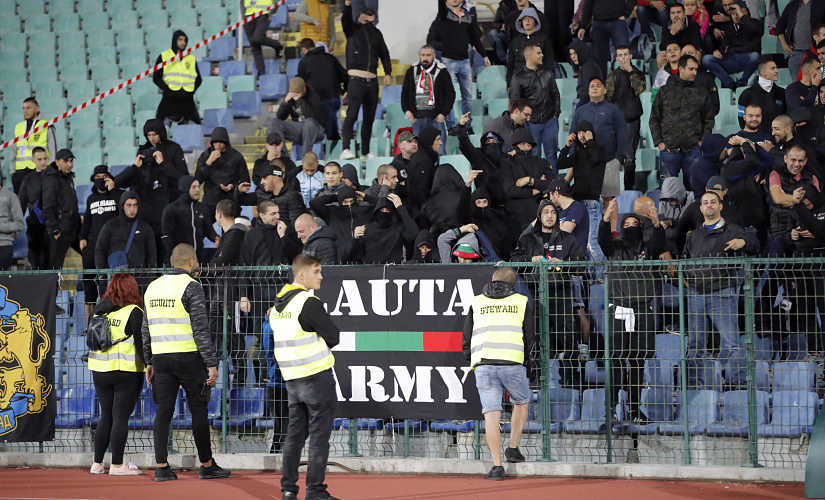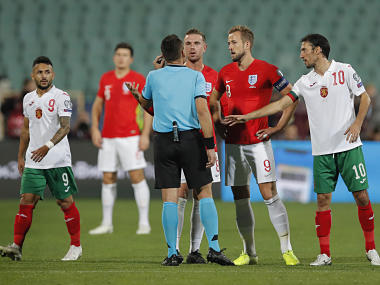England’s worst fears — or thereabouts — came to life on Tuesday night when its national football team travelled to Sofia to play Bulgaria in a Euro 2020 qualifier. Gareth Southgate’s team had sustained a defeat against Czech Republic just three days earlier and the players must have felt the pressure going into the match against Bulgaria. To add to the stress, English players had also contemplated scenarios wherein they expected to be racially abused by fans inside the stadium and had planned the steps would they take. Tammy Abraham, the young striker from Chelsea and also a victim of online racial abuse, told the BBC ahead of the match, “If it happens to one of us, it happens to all of us. Harry Kane even said that if we’re not happy, if a player is not happy, we all come off the pitch together.” The concerns among players were not unwarranted. UEFA had already ordered the partial closure of Bulgaria’s national stadium for the England match after racist behaviour by their fans in the previous qualifying games against the Czech Republic and Kosovo in June. Even before the match started, the English players said they could hear racist abuse during the warm-up. After the kickoff, the first pause came in the 28th minute. A section of fans in the stadium were seen directing Nazi salutes and monkey chants at English players. A stadium announcement was made condemning fans’ behaviour and a warning was issued stating that if they didn’t stop, the match might be abandoned. The second break occurred just before the half-time — this time, it was a longer one involving the referees and England manager. [caption id=“attachment_7512401” align=“alignnone” width=“825”]  Bulgarian fans gesture as they stand in the stadium to watch the Euro 2020 group A qualifying soccer match Bulgaria and England, at the Vasil Levski national stadium, in Sofi. AP[/caption] At half-time, the English team and manager had to make a decision: To continue playing or to walk off the pitch. The players decided to finish the match and not give in to the racist elements. They played the full match, beating their opponents 6-0. The racist chanting in the Vasil Levski Stadium prompted referee Ivan Bebek to follow UEFA’s three-step protocol when dealing with racist abuse by fans. The first step of the process involves a player or players on the receiving end of the abuse informing their captain, who then informs the referee. The referee then asks the PA announcer to inform the crowd about its behaviour and issues warnings about the match being abandoned if the situation doesn’t change. If the abuse doesn’t stop then the referee will lead the players out of the ground and fans will be warned again. If things don’t change even after the match is restarted, then the referee can call the match off after consultation with the players and managers. England defender Tyrone Mings, one of the victims of the abuse, told the BBC, “We made a common-sense decision to play the remaining few minutes and decided at half-time. Everybody made the decision — the manager, the team, the supporting staff. We spoke about it at half-time and we dealt with it and escalated it in the right way.” Greg Clarke, the chairman of Football Association (FA), was at the game and witnessed the abuse first hand. He said it had left a number of the England players and staff visibly upset. “I heard examples of appalling racist chanting. I was looking at a group of people, all in black — about 50 of them — who were making what looked like political fascist gestures. I couldn’t be sure, it was 100 metres away but it looked appalling,” he said. Clarke wants UEFA to conduct a thorough review of the incident during the match and expects more sanctions on Bulgaria Football Union. Meanwhile, heads have already started rolling in Bulgarian football. Prime Minister of Bulgaria Boyko Borissov has called for the resignation of Bulgarian football chief Borislav Mihaylov after the board failed to keep a check on racist incidents inside the stadium. On Wednesday, Mihaylov, who played more than 100 matches for his country, vacated his position . It may have come as a bit of a surprise that the government got involved in the mess overtly, but when the country and their football board has been embarrassed in this way, there’s little else the government could have done. The three-step protocol: Is it the right way? The newly-introduced three-step protocol was a step in the right direction to protect players from abuse. As it has been said numerous times, racism has no place anywhere, let alone in football. Even if it is just one player suffering constant abuse from the fans, the player and his/her team has the power to take a call on the match. Of course, the final decision regarding abandonment of the match lies with the referee, but players have larger role in such situations in terms of communicating their choice. Because ultimately, it is they who are at the receiving end. While there is no reason to doubt UEFA’s intention to protect players, the question here is whether the protocol takes the bigger picture into context. Against England, it was a group of fans — not more than 50, as Clarke said — who caused all the mischief. In football matches, generally speaking, racism comes from a minority. In no way do their actions speak for the majority, whether inside the stadium or society. England were already 4-0 up at the half-time against Bulgaria when they got the chance to contemplate whether to continue playing or walk off. The English players wanted to make a statement, a response to the racists by playing the full match and thrashing their opponents. But let’s also take into account an alternate scenario. What happens when fans abuse the players of a losing team and the match is later abandoned? How does the UEFA or FIFA then deal with such situations? Is it justified to the team who was ahead to play the match again or share the points because of the actions of a minority inside the stadium? In the England-Bulgaria match, things improved in the second-half because security officials could identify the group making racist chants and some of its members were ordered to leave the stadium. However, the whole ’three strikes and you’re out’ rule needs to be relooked. UEFA and FIFA need to consider expanding the scope of identifying miscreants during a match and forcing them to leave the stadium at the earliest signs of trouble. Isn’t this a lot better solution than escalating the situation to a point where the referee and players have to decide whether or not to play the match? If the referees or players or security officials inside the stadium can identify those indulging in racism, why not evict them at the first offence itself? Why give them two warnings and take punitive measures after the third offence? The current protocol might essentially incentivise the fans who want to get under the skins of rival fans, knowing they can do it twice and just be warned. There’s also the question of how much abuse a player or players can take. Now, this is subjective and it should be entirely left to the concerned player. The likes of Raheem Sterling, Marcus Rashford and Mings expected abuse from the crowd and no matter how troubling it was, they wanted to go ahead and play the match. In other cases, some players who are not prepared to deal with such abuse could decide to end their participation in a match. The three-step protocol is inadequate when it comes to addressing this grey area, since limits of tolerance are a very subjective matter. And then there’s the room for misuse of the protocol. If players react to racist elements and opt to walk off the pitch, said elements will believe that they did their job very well. Their objective, of disturbing the opposition’s players and disrupting play, has been achieved. This could even encourage them to do more of the same, no matter how many times they have been warned. Will abandoning a match really stop miscreants from repeating their actions?
That said, none of the above is to say that there shouldn’t be any sanctions. Repeat offenders like the Bulgarian fans should be punished and the country’s football board should take the responsibility of failing to keep a check on such incidents. Lifetime stadium bans to racist fans should be imposed and the board should also be fined and sanctioned for their failure.
UEFA is set to conduct the Euros next year across 12 different cities across Europe. Teams will have to travel to different locations during the course of the tournament. What if the teams face racist abuse from fans at one or more of those venues? How will the players and the board react in such situations when stakes are high? Is it possible to just abandon the matches in a big tournament? Here, the role of UEFA will be crucial. The governing body will be heavily scrutinised and one small misstep can have big repercussions. It’s worth reiterating at this point that racism, or any sort of prejudice for that matter, has no place in football or society. The question of why homophobia and other forms of prejudice aren’t covered by the three-step protocol also merits questioning. So while the protocol in question does have its benefits and offers some amount of protection to players, there are far too many grey areas that need to be addressed and prickly questions to be answered very swiftly.


)

)
)
)
)
)
)
)
)



